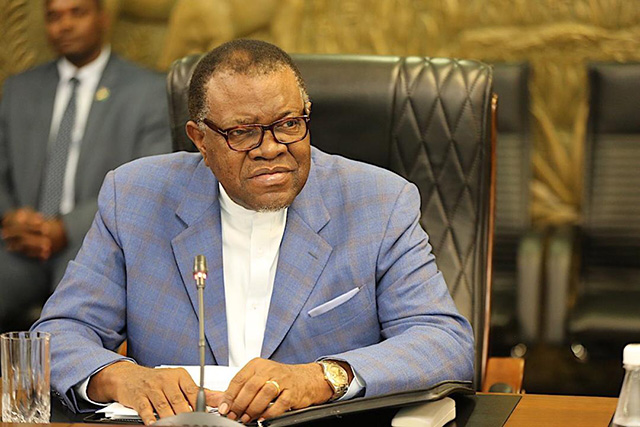[ad_1]
A REGULATION under which president Hage Geingob restricted employers from reducing their employees’ salaries and working hours during the depths of Namibia’s Covid-19 pandemic lockdown in 2020 was unconstitutional, the Supreme Court ruled on Friday.
The regulation through which Geingob suspended some provisions of the Labour Act near the end of April 2020 and in early May 2020 was not reasonable, as it did not take into account employers’ financial difficulties and inability to continue to meet their commitments to employees during the Covid-19 lockdown, the court said in a judgement by deputy chief justice Petrus Damaseb.
Damaseb said: “What emerges clearly is a policy designed to protect the income and livelihoods of employees in the face of the lockdown without regard to the ability of an employer – equally weakened both by the impact of the pandemic and the lockdown – to afford the burden passed on to it by a well-intended government policy.”
Well-intended as it was, the policy underpinning the state of emergency regulation that suspended parts of the Labour Act failed to strike a balance fairly and reasonably between the competing interests of employers and employees, Damaseb said.
“Given the disproportionate harm it caused employers in order to assist employees it is one which no reasonable decision-maker would have adopted,” he said.
The court also found that the regulation was not based on rational grounds.
Damaseb in this regard said: “The underlying policy’s single-minded focus on the short-term gain of securing employees’ income during lockdown, considered against its disregard for the long-term pain to employees from the probable collapse of an employer on account of the impact of the suspension regulations, demonstrates its irrationality.”
The deputy chief justice continued that the regulation in effect required of employers to assume liabilities which they may not be able to meet, due to the blow that the Covid-19 state of emergency and lockdown delivered their financial positions.
“The indifference to the plight of the employer is in my view evidence of the policy’s arbitrariness and therefore its irrationality,” he said.
Although the regulation had a laudable objective, it had no direct relationship to the control of the novel coronavirus epidemic, and the government failed to show that the regulation was justified, Damaseb said as well.
With appeal judges Sylvester Mainga and Dave Smuts agreeing with the deputy chief justice, the Supreme Court concluded that the High Court was correct – although for different reasons – when it in June 2020 declared regulation 19 of the Covid-19 state of emergency regulations as unconstitutional and invalid.
Regulation 19 stipulated that during Namibia’s Covid-19 lockdown period employers may not dismiss any of their employees, reduce their pay or force them to take leave because of the impact the Covid-19 pandemic has on the employers’ business.
Employers were also required to reinstate employees dismissed due to the effect of the pandemic on their business, and to negotiate with recognised trade unions, workplace representatives or affected employees themselves if they wanted to reduce or defer the payment of remuneration during the lockdown period because they were unable to pay their employees’ salaries in full.
In addition to that, the regulation stated that if employers notified their employees of intended dismissals because of Covid-19, the dismissals would only occur 28 days after the end of the lockdown period.
Employers who breached the regulation by dismissing employees, reducing their pay or forcing them to take leave because of Covid-19, committed an offence for which they could be fined N$10 000 or be given a jail term of up to two years, the regulation also stated.
The Namibian Employers’ Federation (NEF), the Namibian Employers Association (NEA) and five companies questioned the constitutionality of regulations issued by Geingob in an urgent application filed at the High Court in May 2020.
The applicants in the case were claiming that their businesses were in danger of going bankrupt if they were not allowed to use provisions in the Labour Act that were suspended by the regulations to try to cut their labour costs.
Senior counsel Raymond Heathcote led the legal team that represented the NEF and three of the companies, while Eliaser Nekwaya represented the NEA.
The president and government were represented by a legal team led by senior counsel Geoff Budlender.
[ad_2]
Source link




